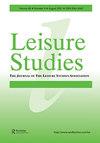Going out before the COVID-19 pandemic protected psychological health during the first lockdown: a model based on social capital theory
IF 2.3
2区 社会学
Q2 HOSPITALITY, LEISURE, SPORT & TOURISM
引用次数: 0
Abstract
This paper shows that greater engagement in offline leisure activities before the outbreak of the COVID-19 pandemic – such as going to bars, restaurants and meeting friends – protected psychological health during the first lockdown in 2020. This result was obtained using structural equations on longitudinal data from a sample of 4,967 individuals (+14) collected in two waves between September 2019 and June 2020. Based on social capital theory, our model tests two routes for the mobilisation of social support prior to the stay-at-home policies: on the one hand, engagement in face-to-face leisure activities; on the other hand, engagement in activities online, such as chatting, browsing the Internet and being present on social media. According to the structural equation model, engagement in both types of leisure activity before the pandemic was associated with higher perceived levels of social support. However, only offline leisure activities have such a positive effect on social support that they protect (indirectly) mental health during the first lockdown, notably a period when social relationships were not nurtured face-to-face. These findings help to unravel further the ties between leisure and mental health in the historical contingencies of the pandemic.基于社会资本理论的模型:在新冠肺炎大流行之前出门,保护了第一次封锁期间的心理健康
这篇论文表明,在新冠肺炎疫情爆发前,人们更多地参与线下休闲活动,比如去酒吧、餐馆和会见朋友,在2020年第一次封锁期间保护了心理健康。这一结果是利用2019年9月至2020年6月分两波收集的4967人(+14人)样本的纵向数据的结构方程得出的。基于社会资本理论,我们的模型检验了居家政策出台前社会支持动员的两条路径:一方面,参与面对面的休闲活动;另一方面,参与在线活动,如聊天、浏览互联网和出现在社交媒体上。根据结构方程模型,大流行前参与这两种休闲活动与较高的社会支持感知水平相关。然而,只有线下休闲活动对社会支持有如此积极的影响,才能在第一次封锁期间(间接)保护心理健康,特别是在没有面对面培养社会关系的时期。这些发现有助于进一步揭示在大流行的历史突发事件中休闲与心理健康之间的联系。
本文章由计算机程序翻译,如有差异,请以英文原文为准。
求助全文
约1分钟内获得全文
求助全文
来源期刊

Leisure Studies
HOSPITALITY, LEISURE, SPORT & TOURISM-
CiteScore
4.90
自引率
14.30%
发文量
85
期刊介绍:
Leisure Studies publishes articles of a high standard on all aspects of leisure studies and from a variety of disciplinary bases, including sociology, psychology, human geography, planning, economics, etc. Shorter research notes and book reviews are also published. The emphasis of the Journal is on the social sciences, broadly defined, and the subjects covered include the whole range of leisure behaviour in the arts, sports, cultural and informal activities, tourism, urban and rural recreation.
 求助内容:
求助内容: 应助结果提醒方式:
应助结果提醒方式:


